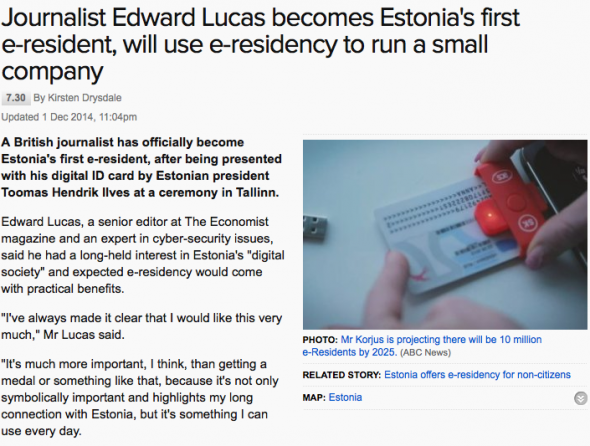
Reviewed by: Alexis Macklin
It did not take me a long time to think of something which is disruptively innovative from my home country Estonia.
Like Uber has shaken up taxi drivers around the world, just as AirBnB is disrupting the hotel industry and fast downloads have disrupted DVD rental shops, Estonians have turned lot of bureaucracy into the digital solutions, leaving many paperwork behind and saving a lot of time.
Estonia, a tiny European country of just over 1.3 million people, is pioneering digital citizenship. Every Estonian over the age of 15 is given a smart ID card, which they can use for thousands of online services like booking doctors appointments, online banking, online shopping, paying parking fines and voting. Every new-born baby is given a digital birth certificate – it’s easy to see that the country takes the idea very seriously.
While this is brilliant in its own right, even more brilliant is the fact that anyone in the world can apply for ‘e-residency’ in Estonia. Called ‘satellite Estonians’, these people are not full residents, but (among other things) they are able to set up a business in the country and hold a fully verified ID card (which is used to access the web securely). The ID makes doing business online safer, quicker and more convenient.
As more and more people around the world get access to the internet and connection speeds get faster, distances and state boundaries will become less and less relevant to business. For example, a driven, bright, African entrepreneur with a great idea could set up her company in Estonia. While her company would provide for Africans and have African employees, she pays taxes to the Estonian government, and that is where it is registered. For someone like her, having the business registered in an EU member state is beneficial for two main reasons: firstly, while Europe is by no means a perfect place to trade, the business infrastructure is highly developed and red tape and corruption are often less of a problem than in many African countries. Secondly, after a new EU rules comes into force soon, member states will be forced to recognize each other’s digital IDs. This further enhances e-Estonians’ ability to do business with other European governments.
Take a look to the case study from Estonia:
https://e-estonia.com/case_studie/leadership-21st-century-style/
E-residency is not a path to citizenship; it’s not legal residency. It cannot be used as a travel document or a picture ID. Instead, it’s a form of supranational digital identity issued, for the first time, by a country. It’s the online self, now with a government imprimatur. And it’s the latest innovation from a tech-savvy nation that brought you Skype.

What Estonia is doing is visionary and very clever, and potentially disruptive to international business as we know it. If this is a taste of the shape of things to come, governments around the world will have to work hard to remain attractive to a new breed of businesspeople. Making things ultra-convenient for people will become really important; great schools and a generous welfare system will mean nothing to someone who has no interest in emigrating to that country.

Wow-this is an amazingly complex innovation! I wonder what could possibly be next in the world of business relations and if other countries will hop on to this trend. It seems that Estonia could get major economic stimulation from businesses applying for e-residency there.
That is so cool, I’ve never heard of anything like it. I want to be an e-resident of Estonia! And I didn’t know Skype started in Estonia. Do you know if any other countries do e-residency?
It is visionary and very clever! Fascinating!
Your post makes me envy Estonia even more, in a nice way, of course. 🙂 I just wonder if the solutions that the solutions your country introduced might be implemented in larger countries, with more people and, of course, more information to deal with. For instance, the discussions in Romania about voting online started some 5 years ago, but nothing was done so far, and the complexity of such a project was an argument against it. I’m glad Estonians are not afraid of big ideas!
Fascinating. One wonders if it is the smaller population size that makes this work. Or is it simply the drive for innovation from the country and its citizens? Where does that drive come from? What is embedded in the culture that makes it happen? And why there and not its nearby neighbors? Key questions this excellent post left me pondering.